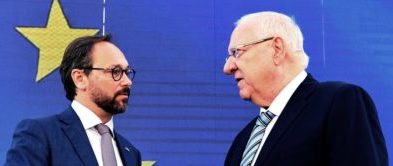
President Rivlin at at Europe Day Reception. Photo courtesy of Mark Neiman, Israeli GPO – gpoeng.gov.il)
A peace treaty won’t be enough to bring peace between Israel and the Palestinians, Israeli President Reuven Rivlin told European Union ambassador to Israel Emanuele Giaufret—but the best peace plan might just be something with which the EU is very familiar. “I believe that we in the Middle East need to learn from the experience of the European Union which succeeded because it was established on the basis of economic cooperation and mutual obligation,” Rivlin was quoted as saying on Wednesday in an Israeli press release.
“By creating a shared economy and bringing people together through trade, the EU created a solid basis for durable peace. We all dream of peace between Israel and the Palestinians and between all the peoples of the Middle East. If we want to realize this dream, we should take a similar approach.”
Speaking with Giaufret and other European ambassadors, Rivlin made it clear that the recent conflict with terrorists in Gaza shows that peace is not a simple matter and it can’t just be on paper. “In the Middle East, like in Europe, there are no short cuts,” said Rivlin.
“We were reminded of that recently, when Hamas fired 700 rockets on Israeli men, women and children and killed four of our citizens. We appreciate the declarations of support many of you sent. But as the ongoing terrorist attacks show, true peace is not made with a piece of paper. Ending decades of conflict requires firstly bringing people together, creating partnerships and strengthening shared interests.”
Rivlin’s vision involved economic cooperation with the Palestinians in joint ventures, saying that not only can Europe help with this, but they “should play a major role in a broad international effort to invest” in such projects.
Said Rivlin, “Let us build Israeli-Palestinian high-tech centers, and joint industrial parks. Let us establish joint research projects between Israeli, Palestinian and European universities, and joint funds between Israeli, Palestinian and European investors.”
In his comments cited by the press release, Ambassador Giaufret did not make any commitments in that regard, but did say that the EU “will remain an important partner for Israel as we celebrate 60 years of diplomatic relations and friendship.” Amidst a multiple-years-long hiatus in Israel-Palestinian peace talks, he also said they “remain committed to peace in the region, and believe it is possible through meaningful negotiations towards a two state solution. The EU reiterates its fundamental commitment to the security of Israel.”
Peace negotiations—much less a peace agreement—seem far away today, as the Palestinians initially refused to negotiate with Israel at all without certain preconditions being met and more recently are boycotting any American-led peace process over disagreements with the Trump Administration’s approach.
Israeli Prime Minister Benjamin Netanyahu, meanwhile, is looking beyond just the Palestinians to a regional approach and sees gains made already. He also has a reason why Israel and the Arab nations should be united.
In comments on Tuesday at an event marking one year since the United States opened their embassy in Jerusalem, Netanyahu was quoted by his office as saying, “There is a new efflorescence, a new renaissance of relations between us and many of our Arab neighbors, and many non-Arab Muslim countries.
“We are united in our desire to stop Iranian aggression. Israel and all the countries of the region and all the countries who seek peace in the world should stand together with the United States against Iranian aggression.”
(By Joshua Spurlock, www.themideastupdate.com, May 15, 2019)
